
LESSON NINE Pompeii by Robert Silverburg
LESSON NINE Pompeii by Robert Silverburg
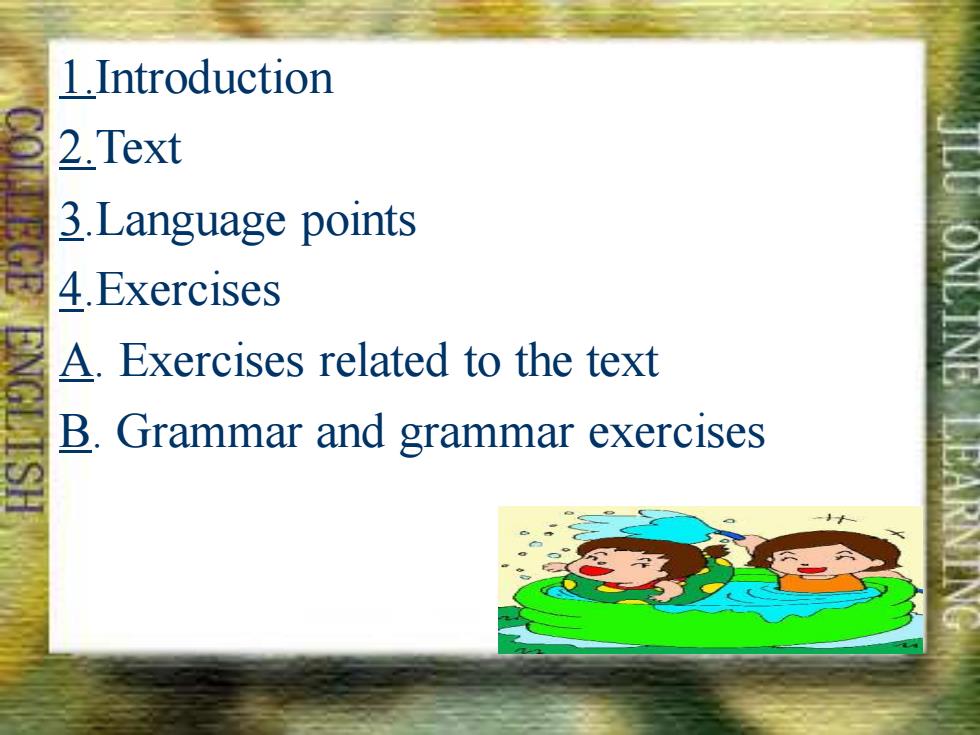
1.Introduction 2.Text 3.Language points 4.Exercises A.Exercises related to the text B.Grammar and grammar exercises
1.Introduction 2.Text 3.Language points 4.Exercises A. Exercises related to the text B. Grammar and grammar exercises
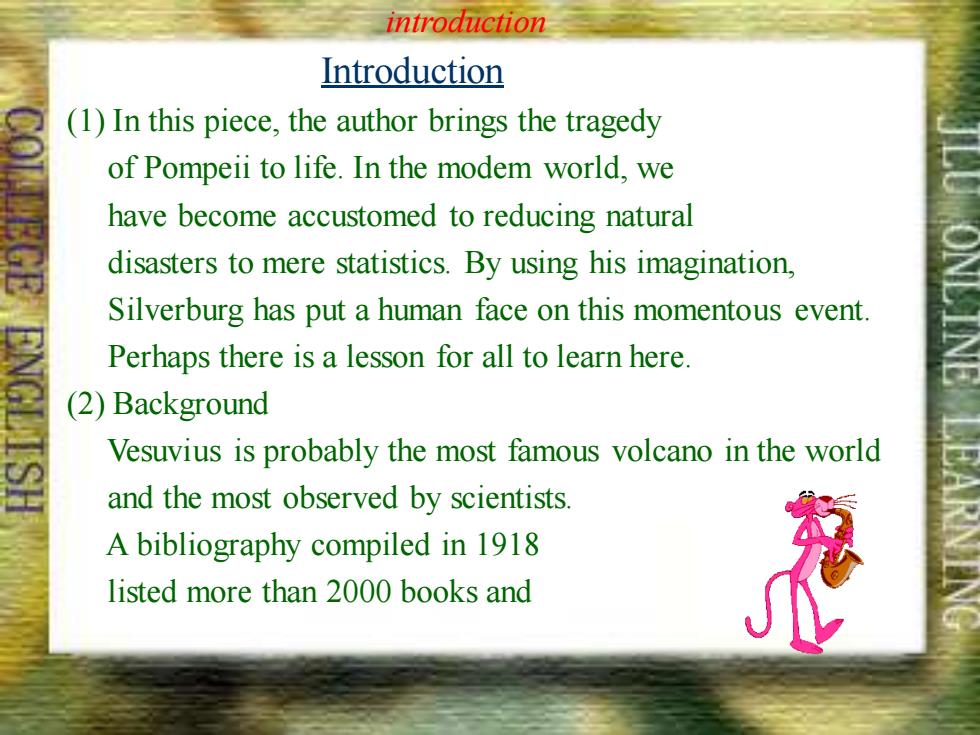
introduction Introduction (1)In this piece,the author brings the tragedy of Pompeii to life.In the modem world,we have become accustomed to reducing natural disasters to mere statistics.By using his imagination Silverburg has put a human face on this momentous event. Perhaps there is a lesson for all to learn here. (2)Background Vesuvius is probably the most famous volcano in the world and the most observed by scientists. A bibliography compiled in 1918 listed more than 2000 books and
Introduction (1) In this piece, the author brings the tragedy of Pompeii to life. In the modem world, we have become accustomed to reducing natural disasters to mere statistics. By using his imagination, Silverburg has put a human face on this momentous event. Perhaps there is a lesson for all to learn here. (2) Background Vesuvius is probably the most famous volcano in the world and the most observed by scientists. A bibliography compiled in 1918 listed more than 2000 books and introduction
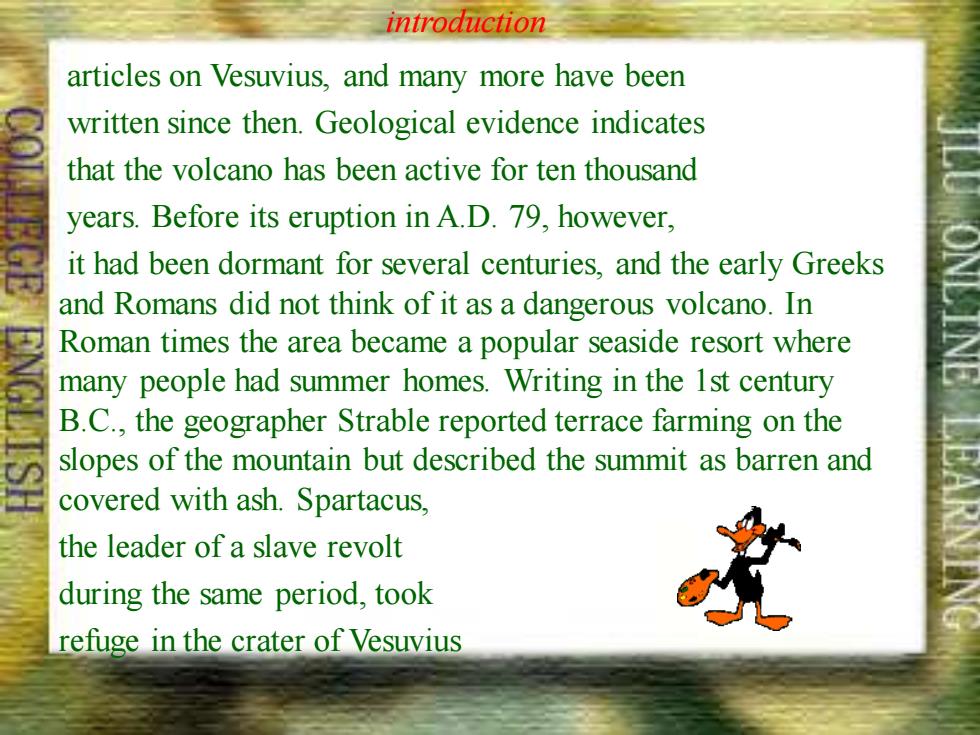
introduction articles on Vesuvius,and many more have been written since then.Geological evidence indicates that the volcano has been active for ten thousand years.Before its eruption in A.D.79,however, it had been dormant for several centuries,and the early Greeks and Romans did not think of it as a dangerous volcano.In Roman times the area became a popular seaside resort where many people had summer homes.Writing in the 1st century B.C.,the geographer Strable reported terrace farming on the slopes of the mountain but described the summit as barren and covered with ash.Spartacus, the leader of a slave revolt during the same period,took refuge in the crater of Vesuvius
articles on Vesuvius, and many more have been written since then. Geological evidence indicates that the volcano has been active for ten thousand years. Before its eruption in A.D. 79, however, it had been dormant for several centuries, and the early Greeks and Romans did not think of it as a dangerous volcano. In Roman times the area became a popular seaside resort where many people had summer homes. Writing in the 1st century B.C., the geographer Strable reported terrace farming on the slopes of the mountain but described the summit as barren and covered with ash. Spartacus, the leader of a slave revolt during the same period, took refuge in the crater of Vesuvius introduction

introduction when he and his followers were being pursued by the Romans.Pompeii was rediscovered in 1748,but systematic excavation did not begin until 1860.About 2000 skeletons were found in hollowsleft in the ash by the bodies of the victims.The archeologists poured plaster of Paris into these hollows and so made plaster casts of men,women,children and domestic animals,looking exactly as they had at the moment of death.Many of them had their hands or cloths in their mouths,indicating that they were trying to protect themselves from the poisonous gas.Several were found clutching bags of coins and other valuables. (the end of the introduction)
when he and his followers were being pursued by the Romans. Pompeii was rediscovered in 1748,but systematic excavation did not begin until 1860. About 2000 skeletons were found in hollows left in the ash by the bodies of the victims. The archeologists poured plaster of Paris into these hollows and so made plaster casts of men, women, children and domestic animals, looking exactly as they had at the moment of death. Many of them had their hands or cloths in their mouths, indicating that they were trying to protect themselves from the poisonous gas. Several were found clutching bags of coins and other valuables. (the end of the introduction) introduction
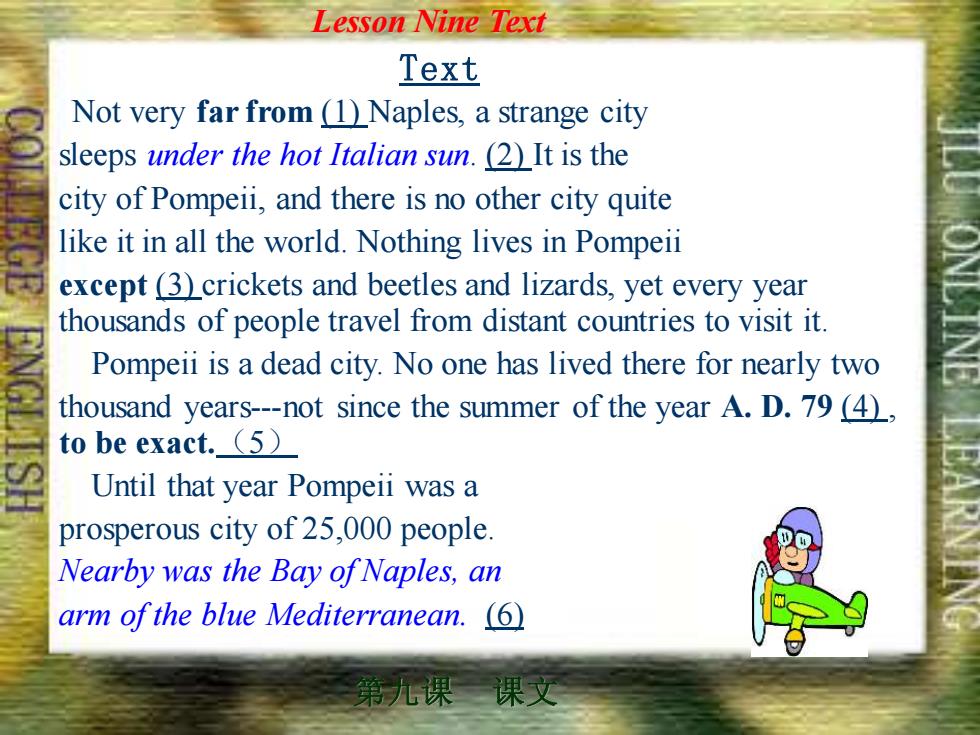
Lesson Nine Text Text Not very far from (1)Naples,a strange city sleeps under the hot Italian sun.(2)It is the city of Pompeii,and there is no other city quite like it in all the world.Nothing lives in Pompeii except (3)crickets and beetles and lizards,yet every year thousands of people travel from distant countries to visit it. Pompeii is a dead city.No one has lived there for nearly two thousand years---not since the summer of the year A.D.79 (4). to be exact.(5) Until that year Pompeii was a prosperous city of 25,000 people. Nearby was the Bay ofNaples,an arm of the blue Mediterranean. (6
Text Not very far from (1) Naples, a strange city sleeps under the hot Italian sun. (2) It is the city of Pompeii, and there is no other city quite like it in all the world. Nothing lives in Pompeii except (3) crickets and beetles and lizards, yet every year thousands of people travel from distant countries to visit it. Pompeii is a dead city. No one has lived there for nearly two thousand years---not since the summer of the year A. D. 79 (4) , to be exact.(5) Until that year Pompeii was a prosperous city of 25,000 people. Nearby was the Bay of Naples, an arm of the blue Mediterranean. (6) Lesson Nine Text 第九课 课文

Lesson Nine Text Rich men came down from wealthy Rome to build seaside villas.Farmlands surrounded Pompeii.Rising behind the city was the 4000-foot Mount Vesuvius,(8)a grass-covered slope where the shepherds of Pompeii took their goats to graze. Pompeii was a busy city and a happy one. It died suddenly,in a terrible rain offire and ash.(9)The tragedy struck (10)on the 24th of August,A.D.79.Mount Vesuvius,which had slept quietly for centuries,(11)erupted with savage violence.Tons of hot ash fell on Pompeii,hiding (12)it from sight.For three days the sun did not break through (13)the clouds of volcanic ash that filled (14)the sky 课
Rich men came down from wealthy Rome to build seaside villas. (7) Farmlands surrounded Pompeii. Rising behind the city was the 4000-foot Mount Vesuvius, (8) a grass-covered slope where the shepherds of Pompeii took their goats to graze. Pompeii was a busy city and a happy one. It died suddenly, in a terrible rain of fire and ash. (9) The tragedy struck (10) on the 24th of August, A. D. 79. Mount Vesuvius, which had slept quietly for centuries, (11) erupted with savage violence. Tons of hot ash fell on Pompeii, hiding (12) it from sight. For three days the sun did not break through (13) the clouds of volcanic ash that filled (14) the sky. Lesson Nine Text 第九课 课文
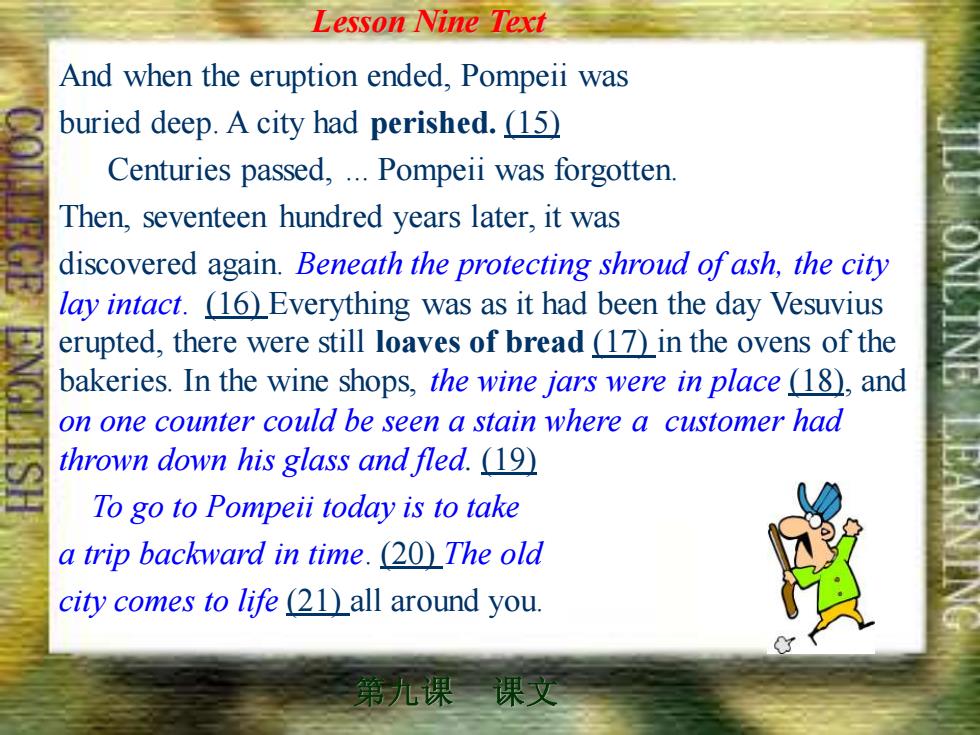
Lesson Nine Text And when the eruption ended,Pompeii was buried deep.A city had perished.(15) Centuries passed,...Pompeii was forgotten. Then,seventeen hundred years later,it was discovered again.Beneath the protecting shroud of ash,the city lay intact.(16)Everything was as it had been the day Vesuvius erupted,there were still loaves of bread (17)in the ovens of the bakeries.In the wine shops,the wine jars were in place (18),and on one counter could be seen a stain where a customer had thrown down his glass and fled.(19) To go to Pompeii today is to take a trip backward in time.(20)The old city comes to life (21)all around you. 课
And when the eruption ended, Pompeii was buried deep. A city had perished. (15) Centuries passed, ... Pompeii was forgotten. Then, seventeen hundred years later, it was discovered again. Beneath the protecting shroud of ash, the city lay intact. (16) Everything was as it had been the day Vesuvius erupted, there were still loaves of bread (17) in the ovens of the bakeries. In the wine shops, the wine jars were in place (18), and on one counter could be seen a stain where a customer had thrown down his glass and fled. (19) To go to Pompeii today is to take a trip backward in time. (20) The old city comes to life (21) all around you. Lesson Nine Text 第九课 课文
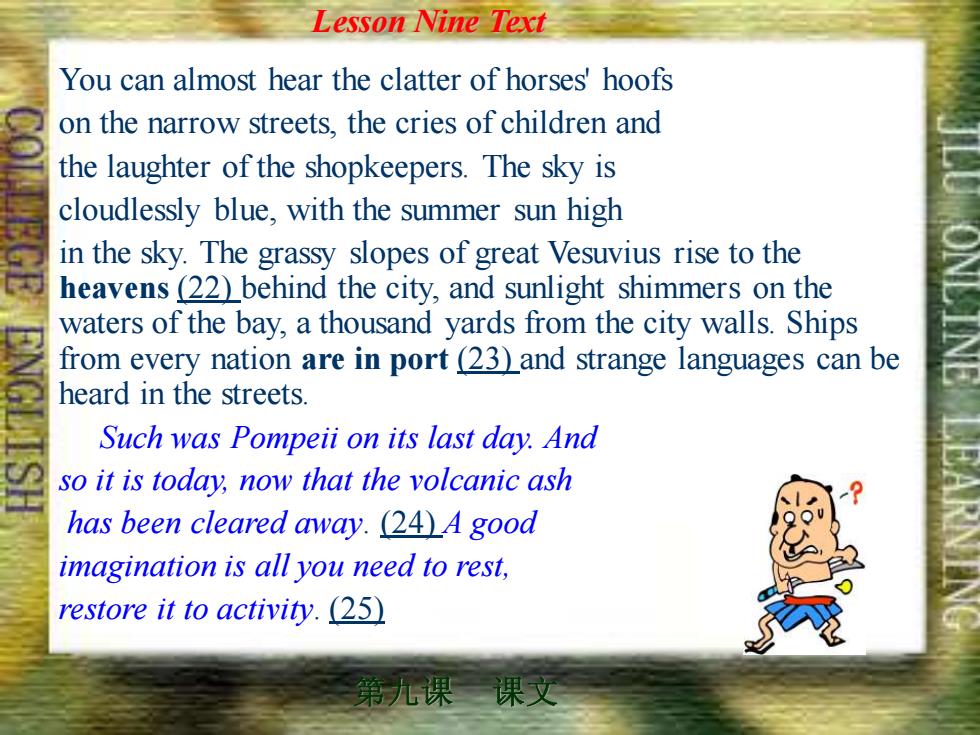
Lesson Nine Text You can almost hear the clatter of horses'hoofs on the narrow streets,the cries of children and the laughter of the shopkeepers.The sky is cloudlessly blue,with the summer sun high in the sky.The grassy slopes of great Vesuvius rise to the heavens (22)behind the city,and sunlight shimmers on the waters of the bay,a thousand yards from the city walls.Ships from every nation are in port (23)and strange languages can be heard in the streets. Such was Pompeii on its last day.And so it is today,now that the volcanic ash has been cleared away.(24)A good imagination is all you need to rest, restore it to activity.(25) 课
You can almost hear the clatter of horses' hoofs on the narrow streets, the cries of children and the laughter of the shopkeepers. The sky is cloudlessly blue, with the summer sun high in the sky. The grassy slopes of great Vesuvius rise to the heavens (22) behind the city, and sunlight shimmers on the waters of the bay, a thousand yards from the city walls. Ships from every nation are in port (23) and strange languages can be heard in the streets. Such was Pompeii on its last day. And so it is today, now that the volcanic ash has been cleared away. (24) A good imagination is all you need to rest, restore it to activity. (25) Lesson Nine Text 第九课 课文
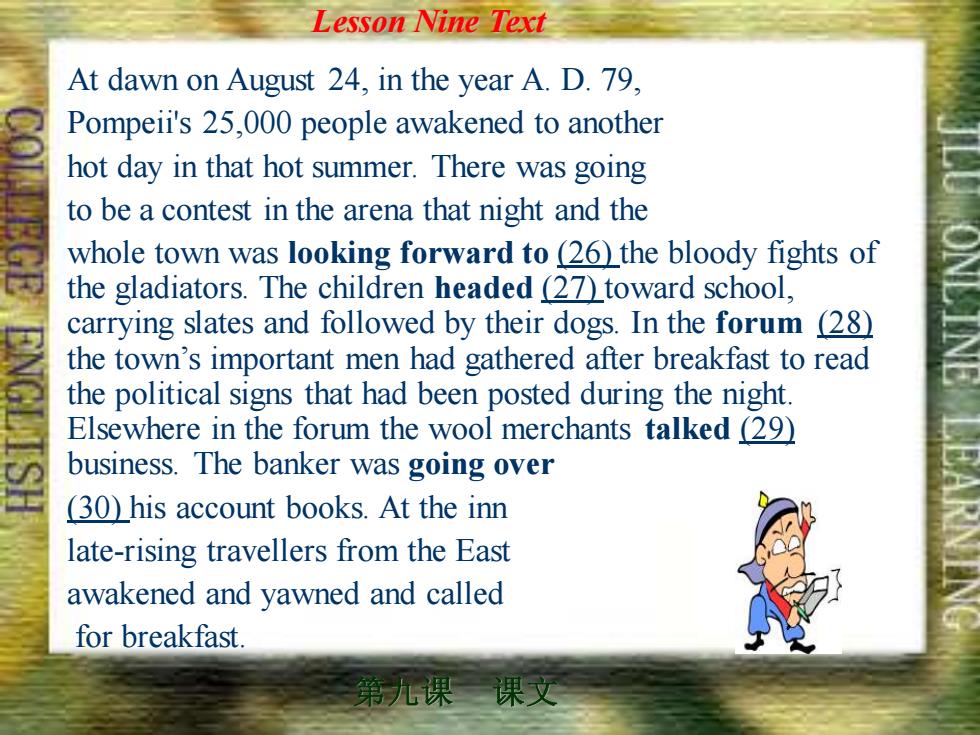
Lesson Nine Text At dawn on August 24,in the year A.D.79, Pompeii's 25,000 people awakened to another hot day in that hot summer.There was going to be a contest in the arena that night and the whole town was looking forward to (26)the bloody fights of the gladiators.The children headed (27)toward school, carrying slates and followed by their dogs.In the forum (28) the town's important men had gathered after breakfast to read the political signs that had been posted during the night. Elsewhere in the forum the wool merchants talked (29) business.The banker was going over (30)his account books.At the inn late-rising travellers from the East awakened and yawned and called for breakfast
At dawn on August 24, in the year A. D. 79, Pompeii's 25,000 people awakened to another hot day in that hot summer. There was going to be a contest in the arena that night and the whole town was looking forward to (26) the bloody fights of the gladiators. The children headed (27) toward school, carrying slates and followed by their dogs. In the forum (28) the town’s important men had gathered after breakfast to read the political signs that had been posted during the night. Elsewhere in the forum the wool merchants talked (29) business. The banker was going over (30) his account books. At the inn late-rising travellers from the East awakened and yawned and called for breakfast. Lesson Nine Text 第九课 课文